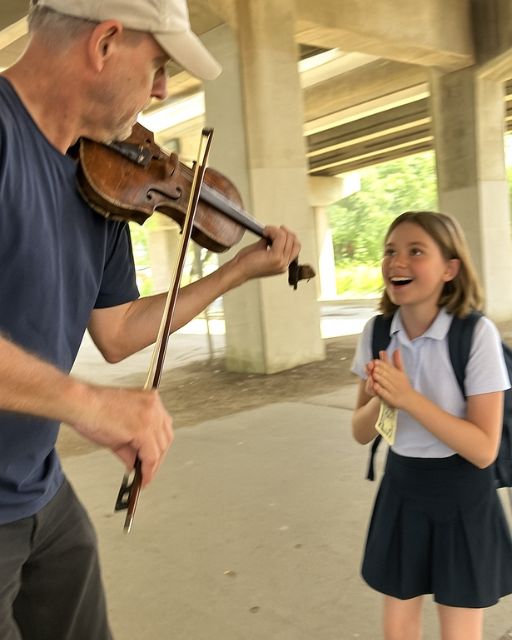I wasn’t even supposed to walk that way.
But I’d missed the bus, and Mom told me to stick to the main road.
Of course I didn’t listen.
I heard the violin before I saw him.
It wasn’t like the fancy recordings my teacher plays in music class—
it was scratchy, raw, almost sad.
But it made me stop.
There he was, under the bridge, playing like the whole world was watching.
But nobody else even looked.
I had five dollars in my pocket.
Not much.
Enough for fries and maybe a juice after school.
I should’ve kept walking.
Instead, I froze right there on the sidewalk.
My feet wouldn’t move.
I just stood and listened, holding onto that five like it weighed ten times more.
And then he looked up.
He didn’t stop playing.
Just smiled, real soft, like he already knew something I didn’t.
I walked up slow.
Dropped the five in his case.
“That was… like magic,” I said.
He winked.
“You’ve got a good ear,” he said, and motioned toward the violin.
“Wanna try?”
And right then, I forgot all about fries and juice and being late for the late bus.
Because I didn’t know it yet—
but this was the day everything started to change.
I held the violin like it might break.
Didn’t even know how to position my fingers right.
But he helped, patient as anything.
Guided my hands. Showed me how to draw the bow across the strings.
It squeaked.
I winced.
He laughed.
“Now you’re playing from the heart,” he said.
“The clean sound comes later. The soul shows up first.”
I stayed there for fifteen minutes, maybe more.
Until the sky started to shift and my phone buzzed with Mom’s worried texts.
Before I left, he pulled something out of the violin case.
A notebook.
Old, beat up, full of scribbles and sheet music.
He tore a page from the back and wrote on it:
Come back tomorrow. Same place. I’ll teach you one song a week. That’s what your five bought you.
He handed it to me like it was a contract.
“You’ve got music in you,” he said.
“Can’t buy fries with that—but it’ll take you further.”
I came back.
Every day after school, for weeks.
I practiced.
Missed buses.
Got blisters on my fingers.
Started hearing music differently—like it lived inside of me now.
And him?
His name was Victor.
Used to play first chair for an orchestra overseas.
Lost it all in a crash—his job, his passport, his home.
Ended up under that bridge with a violin and a notebook full of songs.
But he never stopped playing.
Never stopped teaching.
He said music was how he survived the silence.
The twist?
A year later, I auditioned for my school’s orchestra.
Played the same sad song I first heard under the bridge.
Only this time, it was mine.
I made first chair.
Victor came to the recital.
Sat in the very back.
Same old jacket.
Same soft smile.
Afterward, he handed me a folded piece of paper.
Inside was a page from that same notebook.
And in the corner, in his handwriting:
“The music found you. Keep playing.”
Here’s what I’ve learned:
Sometimes we give away what little we have,
and it comes back as something much bigger.
Sometimes we miss the bus,
take the wrong turn,
and find the thing that was meant for us all along.
And sometimes,
the best teachers live under bridges
and hand out lessons for the price of a smile and five crumpled dollars.
If this story meant something to you, share it. Like it if you believe music—and kindness—can change everything. And if you ever hear something beautiful in an unexpected place— don’t walk past it. Lean in. You never know what it’s teaching you.




